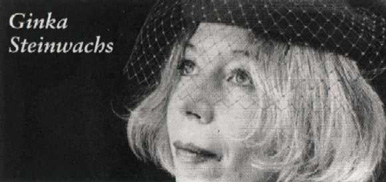
Eivind Tjønneland (Oslo)
"Objet trouvé. I anledning arkivåpningen laget Steinwachs flere installasjoner. Metoden er å finne et objekt som peker seg ut, et såkalt objet trouvé. Duchamp (han med pissoaret) betegnet slike objekter som «readymades». Senere ble metoden overtatt av både dadaistene og surrealistene. Steinwachs trekker frem visittkortet sitt som eksempel. Det er klebet til en S-Bahn-billett: «Ginka Steinwachs – dikter alltid i fartsretningen!» I dagbøkene har hun flere steder klebet inn billetter og laget små dikt rundt dem, for eksempel en side med variasjoner over ordet «ticket» (se bilde neste side).
Eivind Tjønneland: Surrealistisk selvfremstilling. In: Ny Tid Intervju: Akademie der Künste-arkivet i Berlin åpnet nylig med en utstilling av tyske Ginka Steinwachs’ installasjoner. Ny Tid fikk i den anledning en samtale med surrealist-dikteren. (18.08.2017)
Sue-Ellen Case (Ann Arbor)
"... Ginka Steinwachs represents the postmodern German woman playwright. Her playful attitude toward cultural composition, down to the root forms of the language itself, permeates her text. Impossible to translate literally, her words are playful pun composites of etymological and social allusions which detonate rather than resonate their strictures of vocabulary and grammar. The (re)action of words is so central to Steinwachs’s project that she is in the process of completing her own dictionary.
... On the page George Sand is unique in its composition. Perhaps only the later plays of Heiner Müller make a similar use of the written play text.Whole capitalized passages interspersed with regular print and capitalized fragments create the sense of a text set apart, underscored in some way – what Müller, in his work, has described as the final remains of the chorus."
Sue-Ellen Case in Divided Home/Land. The University of Michigan Press. 1992
- Katrin Sieg (Ann Arbor)
"Her work engages with the contemporary debates in feminist theory on the tension between essentialism and poststructralism. ... Steinwachs, a postmodern maverick, navigates between identity politics and its deconstruction and transcendence toward the hermaphroditic `third sex´, demanding `everything plus a tomato´ in the name of women, while simultaneously refuting the notion of female identity. Crossing gender as well as genres, the writer commits tactical acts of critical piracy by raiding diverse theoretical systems and theatrical traditions for their subversive potential, rather than committing to a stable political or aesthetic strategy. - ... Her writing becomes an anagram. Her name becomes the instrument with which she appropriates the world. Rather than emptying language and marking it as that which excludes women, Steinwachs inscribes herself into the world-as-text, transforming it in the process. She invades the domain of the father, mimicking the voices of the great men of art and science and transforming the Originalzitat [original quotation] into a campy Originkalzitat."
- Katrin Sieg in Exiles, Eccentrics, Acitvists. Women in Contemporary German Theater. (The Palatheater of the Mouth.) Ann Arbor: University of Michigan Press. 1994.
David Barnett (UCD, Dublin)
"Steinwachs‘ performance differs from simple role-play or self-stylization in a way that generates a more profound sense of uncertainty in the audience. The richness of the language of the piece, alive with puns and verbal artistry, the ‚gaumenschmaus‘ (mund 97), is simultaneously the theory and its practical articulation. ... In other words subjectivity is transformed by the play of language, so that autobiographical details dissolve into the textures of the performed monologue. The speaker is no longer representing herself."
David Barnett über "der mund ist aufgegangen" In: Text as Material? The Category of ‚Performativity‘ in Three Postdramatic German Theatre-Texts. In: Carolin Duttlinger, Lucia Ruprecht and Andrew Webber (eds), Performance and Performativity in German Cultural Studies (Frankfurt/Main et al: Peter Lang 2003)
Sigrid Schmidt Bortenschläger (Dijon)
"Elle (Ginka Steinwachs) a, de plus, trouvé un mot très joli pour caractériser son travail – elle ne s’appelle pas poète ou femme-écrivain mais <<Originalkopistin>> - je l’ai déjà mentionné, et nous sommes, une fois de plus, confrontées à de difficultés de traduction : on pourrait, peut-être, traduire copieuse originaire, originale ou primaire : tout est déjà écrit dans notre époque post-moderne, tout ce qu’on peut faire, c’est fabriquer des copies, combiner des citations – d’une manière nouvelle, qui ajoute la dimension historique et contemporaine et langagière à des sujets bien connus comme, par exemple, George Sand. Et ce sont ces combinaisons surpenantes qui donnent une nouvelle perspective aux sujets traités, qui font d’une femme-écrivaine à la vie un peu scandaleuse une femme moderne confrontée à des difficultés très contemporaines."
Sigrid Schmidt Bortenschlager: Ginka Steinwachs lectrice de George Sand. In: Camus, Marianne, Rétif, Françoise: Lectrices. La littérature au miroir des femmes. Dijon 2004.